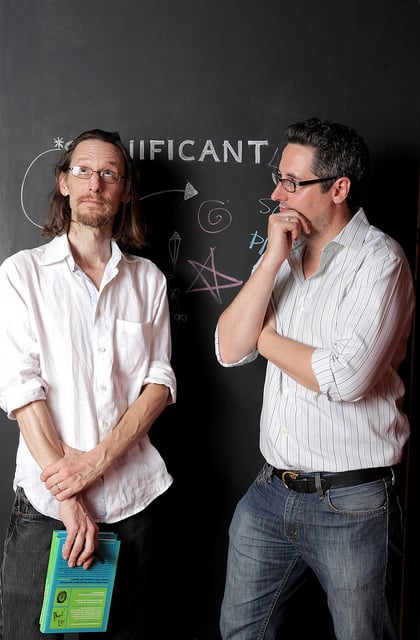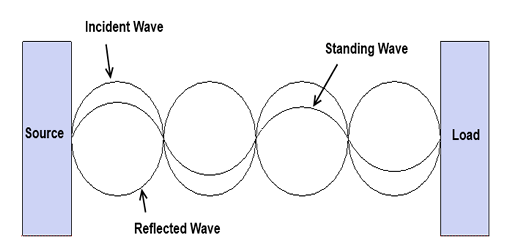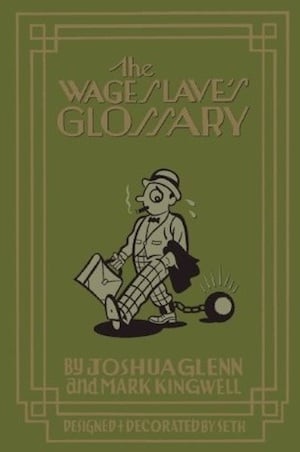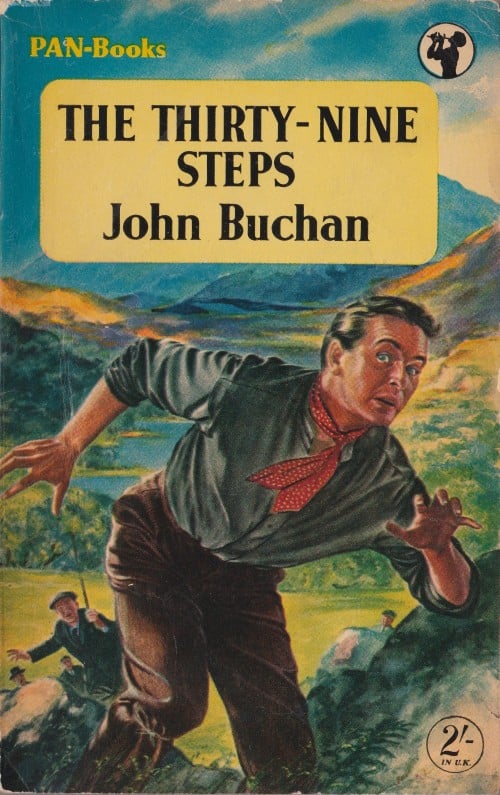You Down with VCP?
By:
March 29, 2015
As readers of this website’s Hypocrite Idler series of posts know, HiLobrow editor Joshua Glenn has a proclivity for productivity. In recent years, he’s earned such well-deserved monikers as “the Vickers Gun of Getting Stuff Done” and “the Platinum Dragon of Making It Happen.”
Back in 2012, Josh revealed to HiLobrow readers the secret of self-promotion: a technique he’s named “Schmoozitsu.” So we’ve asked him, now, to reveal the secret of his productivity. His thoughts on the topic are below. — eds.
Thanks for the kind words, HILOBROW.
I’m just going to offer five notes, here, on the secrets of über-productivity. (I’ll leave the secrets of über-generativity for another time.) The Virtuous Circle of Procrastination, as I’ve long jokingly called my “system,” works for me. I don’t know whether it will work for anyone else. Nor have I developed much in the way of a theoretical framework supporting the VCP. But here goes…

1. BUDDY UP. If you find the right collaborator(s), you’ll become very productive indeed. Why? Because the right collaborator provides everything required — feedback, deadlines, encouragement, humor, inspiration, fresh perspective, criticism and agonistic praise — to prevent you from spiraling into inertia. How to find the right collaborator? Collaborate with someone who is neither more nor less professional than you. By “professional” I mean: self-motivated, organized and reliable, cool under pressure, willing and able to take responsibility and accept blame, transparent and open, cooperative, and flexible. If your collaborator is more professional than you, then you’ll feel guilty — and guilt has a way of turning into resentment and bitterness. If your collaborator is less professional than you, then they’ll feel guilty. It’s not worth the tsuris.

2. OVER-COMMIT. Here we get to the root of the Virtuous Circle of Procrastination. “There is no limit to the amount of productive activity we’re capable of,” my collaborator Mark Kingwell once said, “as long as it’s not what we are supposed to be doing.” Instead of reading Kingwell’s maxim as a lament, I’d urge you to read it as advice: Do what you’re not supposed to be doing, and your productivity will know no bounds. Now, if you’re the kind of person who does one project at a time, then this won’t work. If you don’t do the one thing you’re supposed to do, then the results of your procrastination will be demented ones: rummaging, wandering, brooding. However, if you’re supposed to do four projects simultaneously, then by procrastinating on three of those projects you’ll find yourself overflowing with the purpose and energy required to tackle the fourth. It’s a jiu-jitsu move, a channeling of negative energy into something positive.

3. SURF ENTROPY. All systems want to revert to a state of placid equilibrium, and entropy is what we call the mechanism by which that reversion happens. If the Higgs boson is the answer to the age-old question “Why is there something rather than nothing?” then entropy is the answer to the inverse question, “How does something revert to nothing?” Entropy can be resisted to some extent, but never overcome — and besides, as an idler, I’m philosophically opposed to perfect efficiency. The Virtuous Circle of Procrastination, like all virtuous circles, is composed of multiple feedback loops, the iteration of each one of which loops intersects with the iteration of the others, creating a “standing wave” of sorts. So instead of resisting entropy, try surfing it. Allow entropy to pull you away from your productive beavering-away at one project, but just before it sucks you entirely into a state of inertia — which is not a neutral state, but a weighed-down-ness — hop off and get stuck into one of your other projects. This isn’t efficient, but it’s effective.

4. FAIL BETTER. “In the procrastinator,” according to The Idler’s Glossary, “that lamentable failure of body and will that is languor, or torpor, becomes inextricably tangled with artistic perfectionism.” The VCP is, as noted, a standing wave of sorts, a chaotic and fecund ecosystem of recycling feedback loops — a non-totalizing totality, to borrow language from anti-anti-utopian theorists. Now, the only thing that can destroy a virtuous circle, or a standing wave, is an inflexible interruption — and perfectionism is precisely that. Samuel Beckett’s anti-perfectionism is succinct: “Fail better.” Too stark a maxim? Bre Pettis and Kio Stark’s “Cult of Done Manifesto” helpfully distinguishes between finished and done. “The point of being done,” Pettis and Stark urge us, “is not to finish but to get other things done.” Don’t let finished (i.e., totalized, perfect) be the enemy of done (totality, good). If you do, then you’ll never get anything done.

5. COME CORRECT. The most virtuous possible means of procrastinating on a project due in the immediate future is: tinkering with a project that’s not due any time soon. “Do something today that your future self will thank you for” — I realize that this is a shopworn self-help cliché. But I’m not talking, here, about doing anything meaningful or significant, much less committing to a course of action that will change your life. You don’t need to jump into far-off projects wholeheartedly. Do a little bit of this and that, around the edges of future projects. When Future You becomes Present You, Present You will be grateful to Past You. As with all aspects of the VCP, this is not an efficient way to work. But I’ve found it to be an effective way to avoid the demented time-killing habits (rummaging, brooding, etc.) associated with inertia. Sufficient tinkering and puttering will allow future you to “come correct” — that is, to show up with a first draft that is already kinda awesome.
- With Ron Rentel, in 2014 Josh co-founded the branding agency Semiovox LLC, which employs the tools of semiotic cultural analysis and immersive consumer research to help companies optimize brand communication, develop breakthrough pack designs, innovate, and increase relevancy. Semiovox currently works with PepsiCo, Toyota, MillerCoors, Unilever, Kraft, and other world-class companies. Prior to starting Semiovox, Josh spent 15 years consulting to UK semiotics agencies as a US culture expert; and he was profiled in the New York Times: “For the last two decades, Joshua Glenn has been thinking deeply about things… He analyzes texts and images from the pop culture universe (everything from packaging and advertising to women’s magazines and contemporary films) and prepares reports for marketing companies on how a product or idea means. Not what but how.”
- With coauthor Elizabeth Foy Larsen and designer Tony Leone, in 2012 Josh produced the acclaimed, bestselling family activities guide UNBORED: The Essential Field Guide to Serious Fun (Bloomsbury). “If you can’t find an exciting activity to do in this book, there might be something wrong with you.” — Sports Illustrated Kids. In 2014, the same team produced UNBORED Games (Bloomsbury). In Fall 2015, Bloomsbury will publish a third UNBORED book, UNBORED Adventure; and this coming spring, the “brainy educational toy” company MindWare will release not one but two UNBORED activity kits!
- In 2012, Josh and friends started HiLoBooks, a paperback imprint dedicated to reissuing science fiction novels from the overlooked 1904–33 era that he’s named the genre’s Radium Age. In 2012–13, HiLoBooks reissued 10 overlooked classics: Jack London’s The Scarlet Plague (Introduction by Matthew Battles); Rudyard Kipling’s With the Night Mail and “As Easy as A.B.C.” (Introduction by Matthew De Abaitua and Afterword by Bruce Sterling); Arthur Conan Doyle’s The Poison Belt (Introduction by Joshua Glenn and Afterword by Gordon Dahlquist); H. Rider Haggard’s When the World Shook (Introduction by James Parker); Edward Shanks’ The People of the Ruins (Introduction by Tom Hodgkinson); William Hope Hodgson’s The Night Land (Introduction by Erik Davis); J.D. Beresford’s Goslings (Introduction by Astra Taylor); E.V. Odle’s The Clockwork Man (Introduction by Annalee Newitz); Cicely Hamilton’s Theodore Savage (Introduction by Gary Panter); and Muriel Jaeger’s The Man with Six Senses (Introduction by Mark Kingwell).
- With coauthor Mark Kingwell and the cartoonist Seth, in 2011 Josh published The Wage Slave’s Glossary, a sequel to their 2008 book The Idler’s Glossary. “A utopian book, one that goes beyond the duality of work versus nonwork, beyond leisure activity and slacker cynicism to try to reach a Zen-like ideal of idleness.” — The Los Angeles Times Book Review, on The Idler’s Glossary. In November 2011, when the New York City Police Department evicted Occupy Wall Street’s People’s Library from Zuccotti Park, among those books destroyed (alas) were multiple copies of The Wage Slave’s Glossary.
- With Rob Walker, in 2009–10 Josh curated the widely discussed anthropo-economic value-creation experiment Significant Objects. The project — which subversively used eBay as a literary publishing platform — was captured in a gorgeous 2012 book of the same title, designed by Jacob Covey and published by Fantagraphics. “One of the most life-affirmingly cheeky studies for ages” — The Guardian.
- Here at HILOBROW, in recent years, Josh has: re-periodized the universally accepted generational schema promulgated by Neil Howe and William Strauss; assigned and edited over 1,400 HiLo Hero items; assigned and edited 100 “Enthusiasm” posts on, for example, Jack Kirby comic book panels, old-school hip hop tracks, and typefaces; and definitively identified the 200 Greatest Adventure Novels. Oh yeah, and he’s translated a section of The Argonautica in the style of Agatha Christie. Among other accomplishments.






Readers interested in learning more about Josh’s projects should read the Hypocrite Idler series of posts. And now, without further ado, here are Josh’s thoughts on…
MORE IDLENESS: THE IDLER’S GLOSSARY | THE WAGE SLAVE’S GLOSSARY | The Perfect Flâneur | The Sweetest Hangover | You Down with VCP? | NEW ESCAPOLOGIST Q&A | H IS FOR HOBO — excerpts from The Idler’s Glossary and The Wage Slave’s Glossary | WAGE SLAVERY — Josh Glenn and Mark Kingwell discuss | IDLENESS — Josh Glenn and Mark Kingwell discuss | IDLER Q&A WITH THE PROGRESSIVE | IDLE IDOL: HENRY MILLER | WATCHING THE DETECTIVES | A SCENE FROM GOODFELLAS.
MORE FURSHLUGGINER THEORIES BY JOSH GLENN: TAKING THE MICKEY (series) | KLAATU YOU (series intro) | We Are Iron Man! | And We Lived Beneath the Waves | Is It A Chamber Pot? | I’d Like to Force the World to Sing | The Argonaut Folly | The Perfect Flâneur | The Twentieth Day of January | The Dark Side of Scrabble | The YHWH Virus | Boston (Stalker) Rock | The Sweetest Hangover | The Vibe of Dr. Strange | CONVOY YOUR ENTHUSIASM (series intro) | Tyger! Tyger! | Star Wars Semiotics | The Original Stooge | Fake Authenticity | Camp, Kitsch & Cheese | Stallone vs. Eros | The UNCLE Hypothesis | Icon Game | Meet the Semionauts | The Abductive Method | Semionauts at Work | Origin of the Pogo | The Black Iron Prison | Blue Krishma! | Big Mal Lives! | Schmoozitsu | You Down with VCP? | Calvin Peeing Meme | Daniel Clowes: Against Groovy | The Zine Revolution (series) | Best Adventure Novels (series) | Debating in a Vacuum (notes on the Kirk-Spock-McCoy triad) | Pluperfect PDA (series) | Double Exposure (series) | Fitting Shoes (series) | Cthulhuwatch (series) | Shocking Blocking (series) | Quatschwatch (series)
